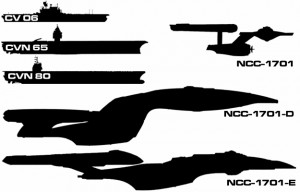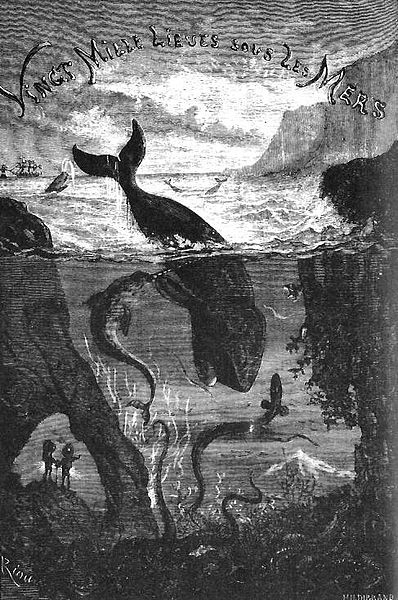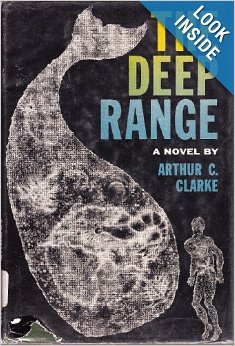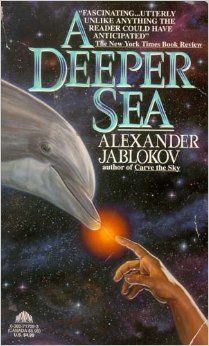
One thing I’ve discovered by publishing my first work of nautical science fiction is that the field is incredibly small. There just doesn’t seem to be that many SciFi writers taking their stories out to sea. This seems strange to me, as most of the great space operas are really nautical tales. There’s a reason that TV Tropes has an exhaustive list of entries under “Space is an Ocean” (and, for that matter, “Space Whale“, because we can’t ever have enough Moby-Dick-in-Space stories). It isn’t a coincidence that the US Navy has named at least 7 ships Enterprise (FYI, the aircraft carrier CVN-80 Enterprise is actually bigger than the starship NCC-1701 Enterprise).
So here are my 5 favorite maritime science fiction stories.

Twenty Thousand Leagues Under the Sea by Jules Verne.
The Grand Daddy of maritime science fiction, 20,000 Leagues still holds up. Even though the science is dated, Verne’s insight shines through, predicting the deep-sea gold rush more than 100 years before we even knew about the geologic formations that would produce seafloor massive sulfides. Considering that almost one-fifth of all deep-sea hydrothermal vents are currently at risk for deep-sea mining, Captain Nemo’s declaration that “in the depths of the ocean, there are mines of zinc, iron, silver and gold that would be quite easy to exploit” is particularly prescient.
The Nautilus itself was a monument to Verne’s vision of the future. Nearly all the essentials described by Verne have been realized in modern submarines.
Finally, no discussion of Verne’s nautical legacy is complete without a response to the most common criticism of Verne’s science – The ocean isn’t 20,000 leagues deep. While true, Verne never claimed that it was. Twenty-thousand leagues refers to the distance the Nautilus traveled, not the depth it dove. Twenty-thousand leagues is well within the endurance of a modern nuclear submarine.

The Deep Range by Arthur C. Clarke.
Growing up, I adored Arthur C. Clarke’s mid-century tale of open-ocean cowboys wrangling herds of whales while cruising around in tiny, personal submarines. The Deep Range is dated, both in terms of science and sentimentality. Our relationship to marine mammals has changed significantly since the 1950’s and the idea that massive swaths of the ocean could be penned off to managed migrating herds was far-fetched, even for its time. But Deep Range makes up for its flaws with strong, compelling characters and it’s author’s clear love for the sea. This won’t be the last time Clarke makes my list.

A Deeper Sea by Alexander Jablokov.
A deeper sea is weird. Really weird. In the near future, we unlock the holy grail of the Magical Dolphin Movement and finally learn how to talk with dolphins. Unfortunately, it turns out dolphins are assholes, so it probably wasn’t prudent of us to turn them into cybernetic soldiers with head mounted lasers (yes Dave, dolphins with fracking lasers predates sharks with fracking lasers). Or give them space-faring abilities. Or fuse whale brains with starships. This is the only book on the list that has a significant space-based component, but it’s worth it, since how else could we find Dolphin Jesus?
Sadly, A Deeper Sea is out of print, with no kindle edition in sight.

Fluke is not hard SciFi, nor is it particularly deep, like some of Clarke’s work, but, of all the books on this list, Fluke is by far the most fun. What starts as a curious story about a marine mammal biologist and his friends and colleagues, rapidly becomes something… different. It’s really hard to talk at length about this one without giving up some deliciously hilarious reveals, so you’ll just have to read it for yourself.

The Ghost from the Grand Banks by Arthus C. Clarke.
The Ghost from the Grand Banks is absolutely my favorite of the maritime Sci Fi genre. Surprisingly, the story itself – two companies racing to raise the wreck of the Titanic just in time for the centennial – isn’t really that strong. As a piece of storytelling, The Deep Range is the far superior book. But Ghost from the Grand Banks warms the cockles of my deep-sea ecologist heart and hits some major grandslams in terms of predicting what marine technology would look like in 2012. He nailed it with autonomous submarines (meet Sentry), ultra-deep oil exploration rigs, deep-submergence technology, and a host of other early 21st century innovations.
Do you have a favorite maritime science fiction novel that didn’t make the list? Share it in the comments below! And don’t forget to check out my own contributions to the genre – Fleet and Prepared.
What, no Peter Watts?
OMG I LOVE Peter Watts!!!!!!!!!!!!
As a marine mammalogist one of the things I like about Fluke is that many of the characters, situations and anecdotes are actually based on real (and sometimes easily identifiable) people and situations. For example the messy scene with the horny whale and dingy… actually did happen.
I recommend “Diving adventure” (by Willard Price)? A sci fi / underwater natural history kid’s book. Somewhat dated but this was one of my favourite books as a kid.
I miss SeaQuest DSV. SeaQuest 2020 was…also a science fiction TV show that took place in the ocean.
Plus, Bob Ballard did his little “the more you know” schtick at the end of every episode. I miss 90’s TV, where every show came with a 2 minute lecture.